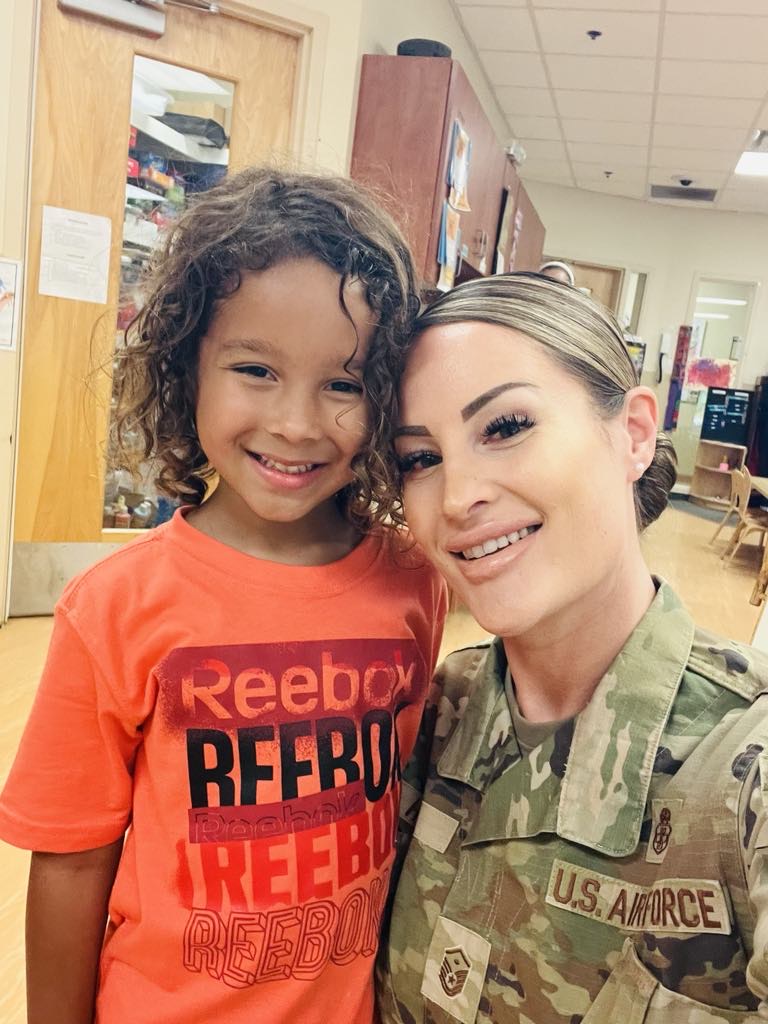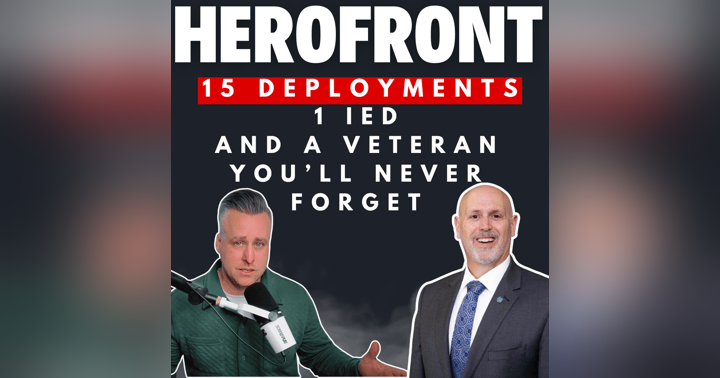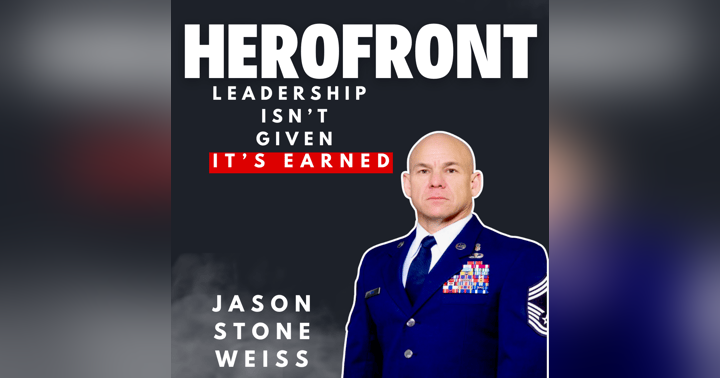Questions I Wish My First Sergeant Had Asked Me — And How I’d Answer Them Now

MSgt Josh White, a medic and award-winning podcaster, sat down with SMSgt Ashley Hall, a decorated first sergeant, for an open Q&A.
For many service members, isolation, trauma, and the weight of expectations can lead to struggles with mental health and dependency. Josh White, a Master Sergeant in the United States Air Force and the creator of the HeroFront podcast, knows this reality all too well. In Episode 71 of the 1 Mile 1 Veteran podcast, Josh opened up about his personal journey, from battling alcoholism and self-doubt to rediscovering purpose, connection, and happiness both in and beyond his military career. The story highlights the transformative power of vulnerability and authentic conversations, showing how even small steps can lead to healing and resilience.
Link: Listen to Josh’s full story on the 1 Mile 1 Veteran podcast
Mental health and the challenges Airmen face due to trauma and isolation are often left unspoken. In an effort to bring clarity and solutions to these issues, MSgt Josh White, a medic and award-winning podcaster, sat down with SMSgt Ashley Hall, a decorated first sergeant, for an open Q&A. Their candid discussion offers tools for early intervention, aiming to inspire leaders and peers to recognize and address struggles before they escalate.
Ashley: You’ve shared how your father’s legacy and your wife motivated you to improve your life during your career. What advice would you give Airmen who don’t have family or a significant other to lean on?
Josh: I’ve asked myself that question many times, and it’s a challenging one. My dad’s incredible Air Force story gave me purpose later in my career (as an E5-E7), but it also brought a sense of shame in my earlier years. He rose from a poor kid in a trailer in West Virginia to become a commander. Meanwhile, I felt like a spoiled son who was failing the Air Force and my family. As for Angie, she’s been my rock, but I understand not everyone has that kind of support. Before meeting her, I was in a dark place—isolated, depressed, and drinking alone. What changed for me were two friends, Jamie Ashburn and Brian Pulak. They refused to let me stay in that cycle. They dragged me out of my apartment when I resisted, and that eventually led me to Angie. To Airmen who feel alone, my advice is to lean into friendships, accept help, and step out of your comfort zone. Even small steps—joining others for a meal or trying a new activity—can lead to a more fulfilling life. It’s not easy, but it’s worth it.
Ashley: Airmen often feel pressured to drink as part of bonding with their peers. How can leaders distinguish between casual drinking and dangerous patterns? There’s a fine line, and as leaders, it’s crucial we recognize it. Social drinking isn’t the issue—it’s when Airmen drink to escape reality, mask insecurities, or numb pain that it becomes concerning. The real problem is the pattern: a troubled Airman spiraling while their peers and supervisors look the other way. People often wait until someone is drowning to intervene, instead of addressing the warning signs when they’re still treading water. It’s that fear of “intruding” that keeps people from stepping in early.
Josh: The pressure to drink starts early in the military, and for some, it becomes a crutch. Over time, this stalls personal growth and takes a toll on their mental and physical health. Leaders like you, who recognize the difference between social drinking and harmful behavior, play a key role. I’ve seen Airmen choose not to drink and still maintain tight circles, but it takes confidence, determination, and of course, practice. I had friends like that, and honestly, they annoyed me at the time because I couldn’t understand how they lived without alcohol. Looking back, they were a beacon of hope—proof that a healthier life was possible.
Ashley: When you felt like you had nothing left to lose, why didn’t you tell anyone? Was it shame, a belief that no one cared, or a lack of someone invested enough to notice?
Josh: It was all of that. In 2010, admitting a mental health issue was taboo. I saw others who sought help face significant stigma. They were assigned menial tasks, ostracized, and blamed for everything that went wrong in the shop. Their annual reports suffered, and their careers seemed doomed. It felt like asking for help would make my already difficult life even worse. Shame was another massive factor. I didn’t want my family to know I was failing. I’m the fourth generation of Airmen in my family and the only son of five siblings. There was immense pressure to live up to expectations, and when I couldn’t, the thought of facing everyone felt unbearable. To me, ending it all seemed less painful than admitting I was struggling.
Josh's conclusion:
In my darkest and most isolated moments, I held on to a faint sliver of hope—a belief that someday, I could rise to become the man I aspired to be, even though that vision felt light-years away and utterly out of reach. I had fallen into a destructive cycle, pushing my drinking to dangerous limits, hoping something catastrophic might force a change. That day came when I was hospitalized with a severe, life-threatening heart virus. It stopped me from drinking temporarily, but before long, I fell right back into the same trap. Why? Because nothing inside me had truly changed. I was still the same ill-equipped Airman White, lacking purpose, the tools to cope, or the courage to ask for help. My poor health was just another symptom of the deeper issue: I had lost respect for myself, and that is a painful and lonely existence.
What ultimately saved my life wasn’t a single moment but the transformative power of love, connection, and purpose. I realized I had been searching in all the wrong places. Slowly, I found my way through friendship, mentorship, honesty, and learning to embrace what I bring to the table instead of being ashamed of it. Funeral honors became my turning point. With a remarkable leadership team, inspirational peers, and dedicated Airmen around me, I let go of my competitive, insecure mindset and leaned fully into serving others. That shift—lifting others up instead of tearing myself down—brought love and support back to me like a boomerang. It filled me with a pride and confidence I never thought possible while sober. The transformation wasn’t just internal; it showed in our accomplishments. In 2018, our Honor Guard team became the Air Force’s top-performing unit, rewriting the A.F.I. I was honored as one of the 12 Outstanding Airmen of the Year, a title my father had earned during his service. Having him as my guest of honor at the award ceremony was one of the proudest moments of my life.
That pride and purpose healed my soul, and I’ve never touched another drink since. Through this journey, I learned that happiness doesn’t just fall into your lap—it requires risk. It’s a reward for stepping out of your comfort zone, learning to love yourself, and then pouring that love into others.
Ashley's conclusion:
As I reflect on the powerful conversation we’ve had, I want to address both those struggling in silence and the supervisors who have the unique power to make a difference in their lives.The weight of expectations, personal struggles, and the pressure to be “strong” can make it feel like you’re carrying a burden no one else can see or understand. But know that you are not alone, and there is no shame in voicing how you feel or seeking help. It doesn’t matter whether you have a family or a support system in place. Connection can be found in the most unexpected places. You are worthy of that connection. Reach out, even if it feels uncomfortable at first. Start small by taking lunch with a coworker, talking to a peer, or speaking with someone who has walked a similar path. It may surprise you how many others can relate or honored to take part in your journey to find hope. It’s through these small steps that change begins. You matter, and there is always hope for transformation, no matter how dark the path may be.
Supervisors are in a position to make a difference. When you see signs of isolation, unhealthy coping mechanisms, or disengagement, don’t be afraid to interject. Step in early. It’s not about “intruding”; it’s about showing that you care. Make your leadership about more than just the tasks at hand—be intentional in fostering an environment where vulnerability is celebrated and supported. Airmen need to know that asking for help is not a weakness, but a strength. Lead with empathy, compassion and grace. Stay approachable and ready for honest conversations. Offer mentorship, guidance, and the support they need to turn things around before things get worse. More importantly, stand with them when they hit their lowest point, because in those moments, they need you more than ever.
It's the little things - small actions - that can make the biggest difference. I'm not perfect nor do I have all the solutions which is why I rely on others and lean on those who care during times of need. Take a step today, whether it's reaching out to someone you care about, nurturing relationships, or pushing yourself out of your comfort zone to ask for help.











